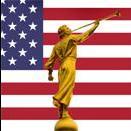Leaderboard
Popular Content
Showing content with the highest reputation on 03/02/19 in all areas
-

Why do so many fail to find God?
prisonchaplain and one other reacted to let’s roll for a topic
At the risk of being overly simplistic, your posts come across to me as “sharing” and not “preaching,” intended to help, not condemn or provoke. For that reason, I read them and appreciate your perspective.2 points -

Why do so many fail to find God?
prisonchaplain and one other reacted to askandanswer for a topic
I almost always enjoy your posts and I certainly respect the way you handle doctrinal differences and disagreements in your posts on this site. I'm not sufficiently familiar with the stereotypes of dry Mormons or open minded Pentecostals to make any reliable sort of judgement as to which of the two your posts sound more like but I'm sure you'd make a great Latter-day Saint.2 points -

Why do so many fail to find God?
Jane_Doe reacted to prisonchaplain for a topic
How does one find God? Whoever looks will find. One can look in the Torah, the New Testament, the Quran, and even the Book of Mormon, and find God promising He will reveal Himself to anyone who seeks Him. It is not so easy, though. We want, so very much, to make our own way—apart from any higher power. You hear this desire all the time. When one says, “God judges the heart,” s/he really means they want to be left to their own devices. Even in churches we hear, “The rules can’t save you—only the Rule Giver.” Well, sure. However, if the Rule Giver saves me will He not give me rules? We fail to trust in God because we want so much to trust in ourselves. What folly! Mao and his communist party tried to create a new socialist man and saw 50 million Chinese starve. He considered these deaths acceptable collateral damage. Godless nobility gives death. Another dangerous road away from God is the search for the good within. China, the Soviet Union and North Korea, in their quest for godless goodness incarcerated people of faith. Stalin’s Russia even used psychiatric hospitals to try to cure Christians of their apparent mental disorders. Inside the church, there are voices suggesting that doctrine—teaching—is not important. A growing church in Los Angeles became famous for helping the poor and for being interracial in the 1970s. Even city government sought out its church leaders, due to their positive works. Yet, behind the church doors the pastor was engaging in fake healings, teaching that humans could be gods, and he was allowing church beatings in the name of discipline. The church was the People’s Temple, and the pastor was Jim Jones. By 1979 the church relocated to Guyana, and over 900 members lie dead, from mass suicide. We must return to our faith in the one good God. In creation God sees his goodness repeatedly. After the great flood wipes out wickedness, God’s man, Noah, declares God’s goodness by building an altar to him. God’s nation, Israel, often declared en masse that he is good and loving. Jesus’ resurrection showed God’s goodness. Paul says that without resurrection we are pathetic, but with it we are most blessed! Finally, even the opponents of God will ultimately declare God’s goodness. The Bible says every knee will bow and confess that Jesus is Lord. God is good—but all the time? Every week I join female prisoners in worship. They flock to Christian chapel. Statistics suggest that 90% of them have been sexually molested. Nevertheless, they come, declaring that life may be hard, but God will get them through. So many who faced bad times, but continued to declare God’s goodness! Despite testimonies to God’s goodness, we gravitate towards our own efforts. Sadly, even when we find the right answers, we usually cannot carry them out. Consider that Unicor, also known as Federal Prison Industries, has a tremendous record for successfully rehabilitating prisoners, so they can return to society and get legal, productive jobs. Nevertheless, the program flounders because local factories want the jobs that Unicor does. So, we know a program that works well, but we do not have the political will to enact it on a large scale. We cannot solve our own problems. Good intentions are not enough. What can we do? We must have right belief: That God is good; that God is one; that Jesus is our only way to the Father; that any good we do must be grounded in God; and that God is love. Is it really that simple? Sure! However, to know Jesus is to love Him. To love Jesus is to serve Him. Will you give up your independent efforts at goodness? Will you trust God to lead you in His way of righteousness? To see a video presentation of this message visit: https://www.youtube.com/watch?v=Jx5S904diRI1 point -

Unexplainable things in scripture
Maureen reacted to JohnsonJones for a topic
I find it would be a similar situation today. If the Lord came among men, not in an angelic progression from the heavens, but just to visit, and did miracles among them as he did for the Nephites and the Lamanites, how willing would people accept him? If a prophet came among the Latter-day Saints but did NOT get authority from the Twelve or the First Presidency and then proceeded to command a mountain from one spot to the other, healed the sick, taught to the poor, and mingled with those we see as destitute and sinners as he taught them and criticized the Leaders of the world...how many of you think the Church leadership would LEAP to SUPPORT him. Do you think they would proclaim him? Or is it more likely they'd either ignore him or warn members that as he had not followed their specific chain of priesthood authority that he was not to be adhered to, despite the obvious miracles? How many other Christian churches do you think would proclaim this visit? And then he left again as it was just a visit prior to his official coming...how many do you think would actually support that he had a visit? Many expect that when the Lord comes he will arrive and talk at General Conference or that the General Authorities will be made instantly aware...but what if that didn't happen. What if, when he came he proclaimed that the Church Leadership was to no longer be the Church leadership and only he was to lead...what would their reaction be today? I think in that instance, it will be MORE on what we hear from the Spirit and whether it confirms his words. So far, everyone who has said something like this has been an imposter...but what about the day, if it comes, when it actually is not? Do you expect that unless he arrives by some miraculous manner, that the Leadership of the Church would suddenly give up their leadership and bow down to an individual who had not received the authority in the prescribed manner as dictated by our Priesthood lines of authority and ordination to office that we do today? Hopefully, today, they would...and will when the second coming arrives (which we do expect to have a glorious arrival), but this describes the type of situation that the Jews had when he came originally. This is the situation we are talking about in the New Testament. They expected someone to come as a Savior from their enemies in glory and a great manifestation to their church leaders. Those Church leaders expected someone who would be one of THEM, and had the authority granted by the measures granted in the church, as well as having constant glorious manifestations to THEM. That is NOT what happened. Thus, he represented a direct challenge to their authority and power as well as to the organizational lines of the Church of the time. For all intents and purposes, with his Twelve Apostles, his ideas would be disbanding their leadership and replacing it with new ones. It was a hard thing to accept for a normal Jew, much less a Church leader who had much of their identity engulfed within the current Jewish religion. When faced with such things people want to either keep to the Status Quo and get rid of the challenge, or if in power, keep their power and prestige and do all they can to diminish the power and prestige of the challenger. Just like today where those in power might try to retain that power and diminish the impact of the Lord if he should come, which would make those who are the normal individual also wonder whether to believe the media and their leaders or not...this is very much like what happened anciently when he came to them as their Savior and Messiah. As we see, some listened to the spirit or felt it and followed him, but many did not. I think in some ways if it had happened today (rather than the meridian of time) it would actually turn out very similar in some ways.1 point -

matter + information = life?
Vort reacted to mordorbund for a topic
The Big Bang is not ex nihilo. All space, time, matter, and energy were contained within a singularity.1 point -

Black LDS History: A Crash Course
JohnsonJones reacted to Suzie for a topic
What are your views on footnote 9? Do the original sources, when taken as a whole, support the idea that President Young was of the view that one day blacks would receive all the blessings of church membership? I believe the original sources do support the idea that Young was of the view that one day blacks would receive the priesthood. However, he was also clear that certain conditions apply (from the same footnotes): " What is that mark? you will see it on the countenance of every African you ever did see upon the face of the earth, or ever will see. Now I tell you what I know; when the mark was put upon Cain, Abels children was in all probability young; the Lord told Cain that he should not receive the blessings of the preisthood nor his seed, until the last of the posterity of Abel had received the preisthood, until the redemtion of the earth. If there never was a prophet, or apostle of Jesus Christ spoke it before, I tell you, this people that are commonly called negroes are the children of old Cain. I know they are, I know that they cannot bear rule in the preisthood, for the curse on them was to remain upon them, until the resedue of the posterity of Michal and his wife receive the blessings, the seed of Cain would have received had they not been cursed; and hold the keys of the preisthood, until the times of the restitution shall come, and the curse be wiped off from the earth, and from michals seed." https://archive.org/details/CR100317B0001F0017/page/n1 In the Deseret News article you mentioned, he also stated: " The Canaanites may believe the Gospel, repent, and be baptized, and receive the Spirit of the Lord, and if he continues until Abel's race is satisfied with his blessings,THEN may the race of Cain receive a fullness of the Priesthood, and become satisfied with its blessings, and the two of them became as one again, when Cain has paid the uttermost farthing." https://newspapers.lib.utah.edu/details?id=2578281 I am not sure if the statement: "President Young said that at some future day, black Church members would "have [all] the privilege and more" enjoyed by other members." truly reflects what Young stated here. Technically sure but that's about it. Edit: Just read JAG's post. Even though as I stated earlier, I believe Young was of the view that one day blacks would receive the priesthood, I am still not sure if his statement fully/properly blend with the other statements he made about blacks receiving the Priesthood. Of course, this is my perception.1 point -

matter + information = life?
askandanswer reacted to CV75 for a topic
I would say the "formula" for life is matter (whether spiritual or physical) + information + agency. I think this is what D&C 93:29-31 indicates. Condemnation, or the abdication of agency, is death (verse 31, but see the verses in this section that have the word "life" in them as a means to describe its opposite), and exaltation (the fulness of joy) is life (v. 33, 34). I would also say that information + agency = intelligence, with the greater use of agency culminating in greater intelligence (see hoe intelligence is used in this section's verses). Existence is only comprehended by intelligent entities, so another "formula" might be: life = matter + intelligence.1 point -

Why do so many fail to find God?
Jane_Doe reacted to prisonchaplain for a topic
Lots of kind reflections. Thank you! I just don't want to be like that minister I heard about who was so subtle, so circumspect, so gentle and kind, that five years after he started his church he proudly said that half of his members were not even Christians. He went on to relay an incident when one of his deacons told him, "Hey preacher, we like all your little stories and everything. We just wish you didn't have to bring up Jesus so much. For some, it's kinda confrontational." This minister thought he was being "organic." "missional," and "getting his hands dirty." IMHO, when the key members are calling for less of Jesus, yikes. Then again, thirdhour.org is not the "spiritual-not-religious" Pacific Northwest. 💕1 point -

Why do so many fail to find God?
prisonchaplain reacted to Jane_Doe for a topic
You come off as an extremely reasonable, respectful, disciple of Christ who's interested in Truth, love, and service. You speak with a small still voice. I know some individuals who try to share Christ by being the most condensing jerks screaming Hellfire to whoever's in the room. That goes no where, and I think your methodology reaches FAR better.1 point -

Struggling with my health...
pwrfrk reacted to StrawberryFields for a topic
Gosh, it’s been awhile! You have another new name for the group! 😁 Can I get some updates to what’s been happening lately? Also, I’m here because I need some prayers if that’s allowed? 🤷♀️ Here goes.. Hi Guys, without going into depth, I’m going on many weeks of health issues and feel like am not improving. I’m not looking any personal attention, or friends and family to panic, and so I’m not saying anything to people who really “know me”. I’m quite private really, but if you have a minute to say a quick prayer 🙏 I’d appreciate it. I believe just a few faithful prayers will make a difference. Thank you.1 point -

Unexplainable things in scripture
JohnsonJones reacted to anatess2 for a topic
The verses supplied does not say anything about chiefs and scribes being troubled. Herod was troubled. Not the chiefs nor scribes. It did mention that Jerusalem was troubled as they understood as a threat to their King is present, not that the Messiah is born.1 point -

Unexplainable things in scripture
JohnsonJones reacted to Traveler for a topic
Not according to the narrative in Matt 2. Bethlehem was not considered the ideal place of birth for the influential and powerful. I can understand that they may have thought that the Messiah would grow up to be the legendary king and liberator - but they knew full well the birth would happen in an otherwise insignificant and lowly place despised and avoided by the ruling upper class. If they had wanted - anyone could have found the Christ child just from the witness of the shepherds and what they had "spread abroad" - which means beyond natural boundaries. What I am trying to point out - is that their error was not a misunderstanding of scripture nor was it because of disbelief or doubt. They knew full well the divine signs of heaven and the prophecies of scripture were being fulfilled - yet they were so filled with darkness - they took all their knowledge and understanding of scripture and sacred things with deliberate intention to thwart G-d and his promises. For the first time in all my longings for understanding scripture I did not even consider that such darkness could dwell in the hearts and minds of religious leaders - especially those so connected to truth and divine revelation. No wonder that as soon of Jesus opened his mouth and spoke - they immediately sought to kill him. The Traveler1 point -
Yesterday, I went with the missionaries to visit inactive families. We got invited into one of the families’ home and I was knocked over by how beautiful her house is, like it was straight out of the Reveal portion of Fixer Upper. Then I found out she has 2 rumbunctious boys under 8 years old. Then I found out her husband just left her not too long ago and she’s been sick for a week. And I almost bowed down chanting, “I’m not worthy”.1 point
-

For those who live in Utah...
Maureen reacted to JohnsonJones for a topic
IF he said this, I'd say he MAY be FAR out of touch with a LOT of people outside of Utah. For example....a prime example...99.9% of them are anti-LDS (but not anti-Mormon)...as a majority of the people outside of Utah STILL refuse to stop calling Members of the Church of Jesus Christ of Latter-day Saints as Mormons. In fact, the common idea of members of the Church is that they are all Mormons. Those non-members that are not part of that Utah culture just simply refuse to stop calling members of the Church...Mormons. A little more seriously though, this is reflective in some ways of an attitude that does exist outside of Utah at times. It is seen that sometimes the Church leaders are so engulfed within the culture found in Utah that policy changes arise from their experiences in Utah more than the rest of the world. It's understandable though, he basically lives in Utah and most of the changes are seen as stemming from UTAH problems rather than anything dealing with the rest of the world in most cases. In fact, that IS something that you see outside of Utah in regards to things changing. Sometimes people will comment on changes and indicate that it's due to things in Utah and Utah culture rather than anything that has to do with the rest of the world. Not EVERYTHING, mind you, but many things. I find the further you go East and out of the US, the more prevalent this idea gets. In California, it doesn't seem as big as it is in Georgia...for example. I've always seen this, so I don't know when it started to exist or if it always existed since Brigham took the Saints to Utah and some went to California or others stayed out East. I think this also reflects and idea that Members outside of the Mormon Belt are in someway different than those who ARE in the Mormon Belt (an area extending from Southern Idaho to Northern Arizona), or the idea that those who are not in areas with a LOT of members are different in culture and action than those that are in those areas (and sometimes this extends to other parts of the Western US as well). Overall, I think that the attitudes in the US are actually very similar outside of Utah as inside of Utah in regards to the Culture of the Church. I think it is a tad different in slight ways when you go outside the US, but overall, the atmosphere is still the same in church. Thus, you will have those that are inactive, those that are super active, those that close knit, and many other commonalities between all members in the US. I would say that even the activity rates are similar to a degree, but are a little more drastically different in other parts of the world (by drastic, I mean over 5-10% difference, whereas in the US, I think most places probably hover around the same activity and inactivity rate within 5-10% of each other). That attitude has been around since at least...well...as long as I can recall and that's been a pretty long time. It may be that you just notice it more. Utah itself HAS changed in some ways over the past 20 years. Brigham Young once told the Saints not to sell their land and to stay on it. He prophesied that if they sold their land that Non-members would move in and they would lose the control they had over the various policies, regulations, laws, and morality within their current areas of living. I find that this is coming true in our day. Ironically, Utah is trying to attract far more people and in the process there are a LOT of non-LDS people moving to Utah. This is not a bad thing, but it means that in the large areas such as Salt Lake City the influence of the Church culture is growing less. It is still there, but these days there is a LOT more pushback. Whenever a visible entity (and in the Mormon Belt the LDS church IS a visible entity that wields considerable influence still, as opposed to outside of it where it is barely even noticed) there will be those who speak ill of that entity. This has always been true of the Church in Utah, but as the non-Mormon population has risen and grown, the impact of this pushback has grown more noticeable. Salt Lake City has it's Mormon quirks, but is very much like most other medium sized cities in the US. It still has a somewhat smaller city feel while still hosting most of the culture available to a larger city. One can find either great good or great evil, depending on what they seek out. If one wants to have a lot of LDS culture in their life it is probably easier to find in Salt Lake City than elsewhere in the US outside of the Mormon Belt. If one wants to find decadence and sin, it is also easily found in Salt Lake City. Provo/Orem has grown more towards what Salt Lake was like around 30-40 years ago. There is still a LARGE LDS population, but the worldly influence is growing by leaps and bounds. I think Ogden has remained about the same to be honest in the past few decades, but it always had the base there to influence it. Logan I feel is somewhat like Provo, though you'll find a looser culture of sorts and easier to find those who are somewhat rebellious, I think it is also very easy to find those who are DEEPLY immersed in the culture of the Church as well. In fact, some of the best and greatest Saints may be found in that area. Southern Utah above St. George is still very Mormon. You move there and you'll be in the heart of Mormon culture. They still live, eat, and breathe the church (though yes, you'll still have inactives, and the rest, the influence of Mormon culture is still very strong there). You'll only feel "oppressed" if you WANT to feel "oppressed" in Utah. There is a greater influence of the Church and it's culture in these areas for obvious reasons, and those who do NOT LIKE this type of culture may tend to dislike it somewhat. However, I find even those who are very anti-LDS love Utah for other reasons. Some love to ski, some love the outdoors and what Utah has to offer in that regards, and various other reasons. Only those who want to feel oppressed or really dislike a heavy Mormon influence will find it. Many of those I think who dislike the atmosphere may be Mormon and because others are Mormon, do not feel unique or special in that way. Outside of the Mormon Belt when you may be the only Mormon around (ahem, I mean, Member of the Church of Jesus Christ of Latter-day Saints) it is far easier to feel as if you are special, or unique. It is easier to feel that because there are so few of you, that you stand out and that makes you stronger. It is harder to hide in the crowd if others know you are Mormon outside of Utah because many may expect things of you. On the otherhand, because there is such a HUGE number of Members in Utah, sometimes it CAN be easier to hide. There are many benefits to living in Utah today. Underwear is easier to get (this actually is a big thing to be honest) if you are looking for a special type that applies to many Members. Church books are more prevalent and easier to find. Church tourist sites are normally easier to access (unless you are living in parts of the Northeast, or Nauvoo where there are also Church tourist sites). Many neighbors will be Members and share your values. There are many benefits to living outside of Utah. For example, I LOVE the environment of the South (US). Utah is a very brown place compared to the South. You do not realize just how green and vibrant the South (and much of the East coast I suppose) is until you've visited Utah and stayed there for a while. Utah has very dry air and for someone that already has dry skin, that can actually be a detriment to healthy skin. It is much harder to keep your skin from peeling and cracked in Utah than it is on the East Coast. Unless you go into the Mountains, Utah lacks trees. Even with the trees in the Mountains, Utah lacks the underbrush which grows so heavily in the South. Utah has cold rain. In the South, in the summer, the rain is warm. Utah is RICH in LDS history, but doesn't have as much cultural richness in US history as the Eastern US. You can't go visit the revolutionary war sites or the Civil War sites like you can out East. I think there are benefits to Utah, and there are benefits to not living in Utah. It boils down more to the individual than it does the area, I think. Those who love to study the scriptures, to attend Sacrament meeting, and other things Saints do will be able to find it no matter WHERE they live. What matters more, I think is what type of area they want to live in. The Green and Vibrant South, the Urban cities of the North, the quiet countryside of the North and the Midwest, the rolling fields of the great plains, the Deserts of the West, the Green Conifer Forests of the North West, what type of area and environment does one want to live in I think is far more important than whether they will have LDS influence or the impact of it on the culture they live in. That is more up to the individual and their outlook than the area they live in itself.1 point -

For those who live in Utah...
SilentOne reacted to classylady for a topic
I love Utah. I moved here from Northern California when I was in 6th grade. I still love California too. If you are the type of person who sees the positive about things, that’s what you will find here. If you look for the negative that’s what you will find. The people are diverse. There are a lot of people who have moved here from out of state. The larger cities are the most diverse. I have always had wonderful neighbors of all backgrounds. If you move here thinking that because Utah is predominantly LDS that most of the people will be following the commandments, think again. The LDS community struggles just like any other community. Many are struggling, just like me, to make good choices. Sometimes I fail, and I can’t be judging people for their weaknesses when I have so many faults of my own. There can be an anti-LDS atmosphere in some work environments. I found that at one of my jobs. I was glad to find better employment where respect for all was followed. If you are kind and friendly, not hypocritical or self-righteous, people will like you. I have loved every ward I have been in. People are good. Sometimes it takes awhile to feel like you fit in, but, for me it’s most likely because I’m more of an introvert and find it extremely hard to socialize.1 point -

Church allows missionaries to call home weekly
StrawberryFields reacted to SpiritDragon for a topic
I have to say that homesickness is something I have never really experienced and can't relate with. Twice a year phone calls were sufficient and I wouldn't want to trade in my experience sending and receiving letters while I was out there. I would think that this might actually increase homesickness by keeping missionaries more connected to home and less to the work, not that the two need to be mutually exclusive, I just recall missionaries getting a lot more trunky after Christmas and Mother's Day phone calls. Instead of talking about investigators needs and setting up appointments with ward mission leaders the conversations would drift into where they plan to go to school and their mom's apple pie for Sunday dinner what they plan to do with their car when they get home (the one mommy and daddy were buying them for making it two years - gag) I'm not saying it's a bad change, and I support the church leaders on it, but I'm glad it wasn't how things were done on my mission.1 point -

Are all the leaders rich?
KScience reacted to NeuroTypical for a topic
When you're a vital part of an executive team of a worldwide organization with enough power to have an influence in various ways, maybe even impact stock prices here or there, get world leaders to do this or that, you get paid millions. The head boss person gets paid millions, his dozen or so executive VPs get paid slightly smaller millions. Everyone has golden parachutes and severance packages and retirement plans and stock grants, and have fancy homes in rich areas. The leaders of our church, lead such a powerful organization. They meet with world leaders, move resources around for various projects, have an impact on a local, state, and even occasionally national level. Our leaders make about as much as a pastor with a medium/large congregation in a medium/large midwestern town. They have no retirement. They are expected to maintain a rigorous travel schedule that grows old very fast for any human. They spend much of their time attending the same half dozen meetings over and over again. Until they die. No sane person seeking to climb to higher levels of career success would want to come within a million miles of getting sucked into a GA calling. In fact, such callings represent the end of growing in career success. There really is no comparison. The only reasonable explanation for our church's leaders doing what they do, is they believe in what they are doing.1 point -

Donald Trump does NOT vilify President Monson in Obituary
StrawberryFields reacted to NeedleinA for a topic
White House Statements & Releases Statement from President Donald J. Trump Regarding the Passing of Thomas S. Monson, President of the Church of Jesus Christ of Latter-day Saints Issued on: January 3, 2018 Melania and I are deeply saddened by the death of Thomas S. Monson, a beloved President of the Church of Jesus Christ of Latter-day Saints. While serving for over half a century in the leadership of his church, President Monson demonstrated wisdom, inspired leadership, and great compassion. Considered a prophet by the nearly 16 million members of the LDS Church, his message was one of optimism, forgiveness, and faith. Our thoughts and prayers are with his three children and the rest of the Monson family.1 point -

Donald Trump does NOT vilify President Monson in Obituary
StrawberryFields reacted to Vort for a topic
Donald J. Trump, Blowhard-in-Chief, is gracious and sympathetic. The New York Times, the self-proclaimed voice of tolerance and reason, is petty and vindictive. This does not accord with the narrative being presented. I'm so confused.1 point -
The first session will start with prayer and the last session will end with prayer. Whether any other prayers will be said in between, I'm not going to guess. There will be singing, talks, and some sustaining. Something will be announced. No fewer than 5 people will take notes with fountain pens.0 points
